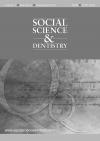Social Science and Dentistry

- Cover Date:
- December 2010
- Print ISSN:
- 2040-4263
- Vol:
- 1
- Issue:
- 2
Mothers’ understanding of dental-caries related feeding practices and children’s use of dental care in Ajman
Aim and objectives: To investigate mothers’ understanding of dental-caries-related feeding practices and children’s use of dental care in Ajman. Design: Six focus groups were selected, each comprising 5-10 mothers from urban or rural areas and different nationalities. Questions were formulated using information obtained from a previous questionnaire survey using a funnel approach. The information from transcripts was analysed using standard qualitative manual thematic coding. Results: 42 mothers participated. While eager to improve children’s oral health, the mothers held slightly unfavourable attitudes towards the diet of their young children, suspecting that their children’s diet could be improved in order to be ‘healthier’, but also citing pressing social and cultural constraints which made that difficult to achieve. However, at the same time as wishing for a healthier diet, certain beliefs about oral health existed among the mothers, which worked against what a dental professional would consider to be desirable nutritional guidelines and oral health behaviours. The use of dental services was hampered by barriers such as cost, long waiting time and anxiety. Primary teeth were not highly valued by poorer mothers. Conclusion: The mothers’ knowledge of dental caries and the cariogenic effects of some foods were at odds with contemporary understanding. There appears to be an urgent need for oral health programmes targeted at the treatment and underlying causes of dental caries.
Key words: Caries, diet, qualitative study, UAE
- Article Price
- £15.00
- Institution Article Price
- £
- Page Start
- 97
- Page End
- 107
- Authors
- Raghad Hashim, Ruth P. Fitzgerald, Cyril T. Schafer, W. Murray Thomson
Articles from this issue
- Title
- Pg. Start
- Pg. End
- Journey to the dental office: a study of dental illness behaviour exhibited by people visiting government and private dental services in Delhi, India
- 69
- 76
- Exploring the concerns and needs of patients with terminal head and neck cancer and their caregivers
- 88
- 96
- Mothers’ understanding of dental-caries related feeding practices and children’s use of dental care in Ajman
- 97
- 107
- Anxiety reduction via brief intervention in dentally anxious patients: a randomised controlled trial
- 108
- 117
